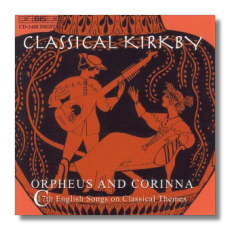
The Internet's Premier Classical Music Source
Related Links
- Latest Reviews
- More Reviews
-
By Composer
-
Collections
DVD & Blu-ray
Books
Concert Reviews
Articles/Interviews
Software
Audio
Search Amazon
Recommended Links
Site News
 CD Review
CD Review
Classical Kirkby

Orpheus and Corinna
- Henry Lawes:
- Legousin hai gunaikes
- Away, away, Anacreon ('Anacreon's Ode Englished')
- Anacreon's Ode, call'd The Lute (original Greek)
- Anacreon's Ode, call'd The Lute ('English'd, to be sung by a Basse alone')
- Orpheus' Hymn to God
- At dead low ebb of night ('A tale out of Anacreon')
- John Blow:
- Sappho to the Goddess of Love
- Sappho to the Goddess of Beauty
- John Wilson:
- Diffugere nives (Horace, Odes IV, 7)
- Integer vitæ (Horace, Odes I, 22)
- Thomas Campion: When to her lute Corinna sings
- John Eccles: Corinna now you'r young and gay
- Nicholas Lanier: Hero and Leander (Nor com'st thou yet)
- Alfonso Ferrabosco II: So beautie on the waters stood
- Maurice Greene: Orpheus with his lute
- John Weldon: Stop, O ye waves
- William Boyce:
- When Orpheus went down to the Regions below
- An answer to Orpheus and Euridice (the Words by a Lady)
Emma Kirkby, soprano
Anthony Rooley, theorbo-lute
BIS CD-1435 54'11
It is salutary to recall how strange Emma Kirkby's pure vibrato-less voice sounded to us when she was launched upon the public; I first heard her at the Royal Albert Hall in Monteverdi's Vespers 1602 and was mesmerised by this extraordinary apparition with her long fair hair, a veritable angel. As a classics student at Oxford, and then a schoolteacher, she sang for pleasure without any intention to become a professional singer. She had not been taught to sing thus, but found it natural for her to do so and in 1973 began her long association with the Consort of Musicke. It was not long before her way became a bench-mark for aspiring baroque singers.
This new CD is particularly strong for the unfamiliarity of most of the verse selected, and its quality, appropriately so because the programme was first given in lieu of an inaugural lecture when Emma Kirkby was elected Honorary President of England's Classical Society. She sings Anacreon in Greek and Horace in Latin. Henry Lawes links seventeenth century England with Greece in c.500 BC. Composers like Campion (poet and composer) were polymaths with wide ranging scholarship which fed his sources; the best known song here is his tribute to a Boetian poetess, When to her lute Corinna sings. A group of five songs draw on legends about Orpheus, the last two by William Boyce humorous (Pluto took pity on Euridice and took her back from matrimony "before 'twas too late, And said she'd be happier in Hell"), prefiguring Offenbach's disrespectful treatment of ancient mythology.
Emma Kirkby is accompanied (a little too discreetly for my preference) by Anthony Rooley on the theorbo-lute, an instrument which is often overshadowed within period orchestras. With full texts in English, plus the original Greek and Latin when required, and full notes by Anthony Rooley and Emma Kirkby herself, this anthology is a very welcome addition to the vast Kirkby discography.
Copyright © 2002, Peter Grahame Woolf


















